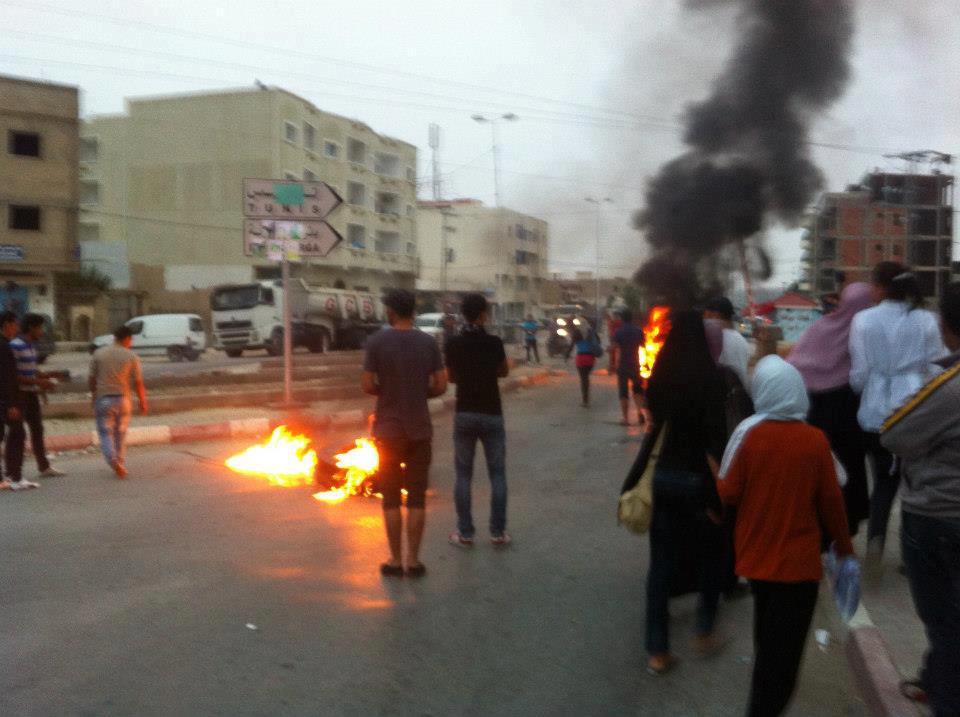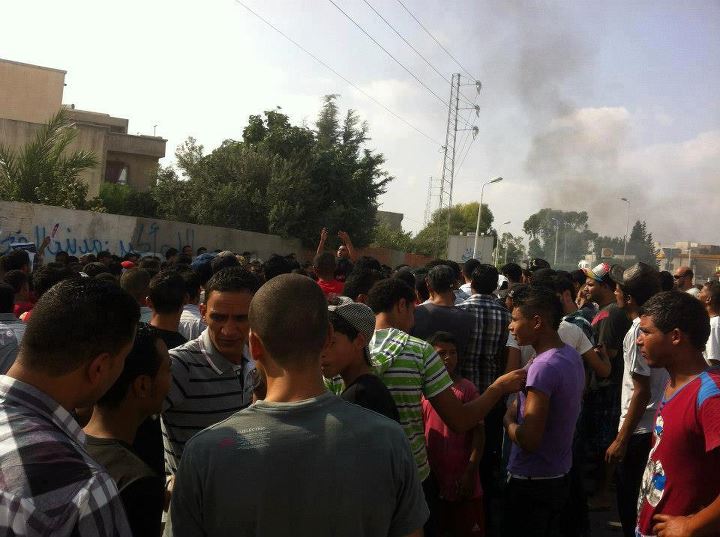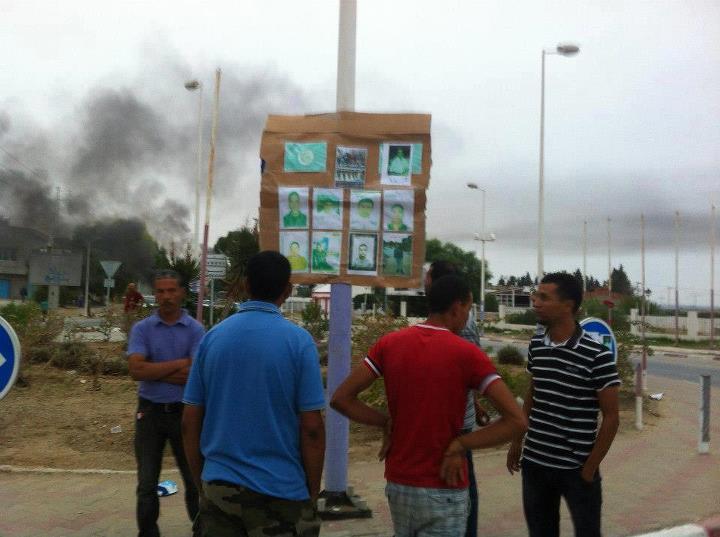english version : see below
Più di 80 persone disperse. E’ questo il racconto che ci arriva dai sopravvissuti dell’ultimo naufragio sulle coste di Lampedusa avvenuto nella notte di giovedì 6 settembre. E mentre l’Italia metteva in scena la macchina dei soccorsi, ormai rodata in anni di abitudine, in Tunisia stava accadendo qualcosa di nuovo. Dapprima in rete e poi da ieri, lunedì 10 settembre, una protesta a Tunisi davanti al Ministero degli esteri, una manifestazione in serata, un’altra manifestazione a Sfax, uno sciopero generale a El Fahs, nel governatorato di Zaghouan, luogo di provenienza di alcuni dei dispersi e la collera dei genitori e dei parenti, hanno fatto muovere il governo tunisino, accusato nei primi giorni non solo di immobilismo ma addirittura di indifferenza per aver partecipato alla celebrazione di un matrimonio collettivo anziché proclamare il lutto nazionale. Attualmente, una delegazione con a capo il segretario all’immigrazione Jaziri si trova sull’isola di Lampedusa, da cui, per la prima volta, anche questa un’assoluta novità, giungono parole di lutto non trattenute da frasi di circostanza dalla neo-eletta sindaca dell’isola, Giusi Nicolini, che si spinge a suggerire quanto “sia assurdo farli arrivare in questo modo”. Un’allusione, seppur velata, alle responsabilità.
Già, perché questo è il punto, di chi sono le responsabilità? Il naufragio di giovedì è solo l’ultimo di una lunga serie di morti e dispersioni avvenute nel corso di ormai lunghi anni nel Canale di Sicilia e in altri luoghi del Mediterraneo. Un cimitero marino che ha sommerso le vite e i desideri di migliaia e migliaia di corpi, di donne, uomini e bambini. Ad ogni naufragio un fiume di parole di commenti, molte o poche, a seconda dell’emozione suscitata, e poi un nuovo silenzio in attesa di quello successivo. Certo, sta accadendo qualcosa di nuovo dopo il naufragio di giovedì, sarebbe assurdo non vederlo, come qualcosa di nuovo è già accaduto in Tunisia da molti mesi, da quando le mamme e le famiglie di altri “dispersi” hanno cominciato a chiedere conto alle istituzioni del loro paese così come a quelle italiane della vita dei loro figli, partiti subito dopo la rivoluzione e declinando così, come libertà di movimento, la libertà appena conquistata. Come gruppo di donne che in vari modi ha sostenuto la lotta di queste famiglie, non vorremmo, però, che anche questa volta, in cui accanto alle parole ci sono azioni di rivolta, si eludessero alcune verità.
Non è dell’acqua del mare la responsabilità di quei morti e dispersi. Non è dell’eventuale lentezza dei soccorsi, seppure anche su di essa di volta in volta sia necessario indagare. Non è nemmeno un problema di affinamento dei sistemi e delle tecnologie di controllo, come in questi giorni con stupore abbiamo letto sulla rete in alcuni appelli di associazioni europee. I controlli sono già lì, con tutte le loro tecnologie, tra le più affinate e avanzate, volte a produrre esattamente questo: corpi che passano e corpi fantasmi, morti o dispersi che li si voglia chiamare. Non è la rete del “traffico degli umani” quella a cui chiedere conto, perché, insieme alle morti, quella rete è prevista e voluta dalle attuali politiche migratorie. Non è, da ultimo, il governo tunisino quello a cui addossare la colpa dei suoi pochi controlli lungo le coste, della sua iniziale immobilità e della sua insensibilità, per quanto offensiva. O meglio, non è questo il vero problema. Certo, la proclamazione di un lutto nazionale, anziché la celebrazione di un matrimonio, sarebbe stato un passo significativo, ma persino il lutto e il pianto collettivo, a volte, possono servire a coprire anziché a svelare le responsabilità.
Rischiamo tutte e tutti, in questi giorni, proprio mentre qualcosa di nuovo sta accadendo, di lasciarci prendere da un inganno, o da un “grande inganno” se ci fermiamo a questo senza chiedere conto sino in fondo di quelle vite. A chi farlo? Alle politiche di governo delle migrazioni, dettate dall’agenda dell’Unione europea, e ai loro molteplici attori: l’Italia e il precedente e l’attuale governo tunisino per la loro complicità nel permettere tali politiche, in questo caso, le agenzie di controllo delle frontiere, le organizzazioni intergovernative a loro volta portatrici di un’idea di governo della mobilità. Uniche e unici responsabili di quelle morti e ancora una volta di non rispondere alla domanda essenziale: perché quelle donne e quegli uomini non hanno potuto prendere una nave di linea, un aereo, un qualsiasi mezzo di trasporto concesso ai cittadini europei per attraversare quel breve tratto di mare che divide le due sponde del Mediterraneo? Chi decide e perché questa differenza tra le due possibilità di mobilità? Il resto è un “resto”, previsto nella logica di tali politiche: a partire da quelle morti, dal Mediterraneo come cimitero marino, dalla lentezza o dalla solerzia dei soccorsi, dalla macchina tecnologica di un sapere più o meno affinato per il filtro del passaggio delle esistenze che potranno arrivare, per essere espulse o clandestinizzate, e di quelle che dovranno essere sommerse dall’inconsapevole complicità del mare.
“Un resto”, in cui, proprio i migranti tunisini con il loro agire la libertà, compresa quella essenziale di movimento senza cui la parola libertà rimane una parola vuota, ci hanno detto di non voler rimanere imbrigliati. “Un resto” di cui dapprima le madri e le famiglie dei giovami dispersi nel 2011 e ora le famiglie dei dispersi di quest’ultimo naufragio chiedono conto, insegnandoci che quel “resto” sono vite, figli, esistenze e desideri.
Quel “resto” sono vite che contano e di cui chiedere conto a chi decide di non farle contare.
Crediamo sia questo il messaggio che ci arriva in questi giorni dalla Tunisia: una ribellione collettiva contro le politiche migratorie come parti integranti di un governo economico sulle vite che le sta inghiottendo su entrambe le sponde.
Le Venticinqueundici
Making lives count against those who have decided to disregard them
More than 80 people are missing. This is the story told by the survivors of the last shipwreck which happened close to Lampedusa coasts the night of September 6. And while Italy was staging the rescue machine, as it’s been the case for many years now, something new was taking place in Tunisia. At first it took place on the web, then in other Tunisan cities – a demonstration in Tunis in front of the foreign affairs ministry, another demonstration in Sfax, a general strike in El Fahs, in the governorship of Zagouha, the place where some of the missing migrants were from – and also through the anger of parents and relatives. All of that made the Tunisian government move; indeed, during the first days the government was blamed not only for immobilism but even for indifference since it took part to a collective marriage celebration instead of proclaiming a national mourning for the shipwreck. At the moment, a delegation headed by Jaziri, the Tunisian Secretary of Immigration, is in Lampedusa, where, the newly elect mayor Giusi Nicolini expressed words of mourning underlying how “absurd it is that people should arrive in this way”. A hint, even if just a veiled one, to the issue of responsabilities, beyond the usual set phrases usually pronounced in these circumstances.
Indeed, this is the point: who is responsible for the shipwreck? The shipwreck of the last Thursday only the last of a long series of deaths and missing people that happened over years in the Sicilian Channel and other places in the Mediterranean. A marine cemetery that has been submerging the lives and the desires of thousands and thousands of bodies, women, men and children. Each time that a shipwreck happens, flows of comments follow, many or just a few, in a large or small amount, depending on the emotion aroused. And then again another silence, waiting for the next shipwreck. Of course, something new is happening after the shipwreck on Thursday and it would be absurd not to see it; as after all something new has been happening in Tunisia for several months, since the mothers and the families of other “missing” people begun to demand both to Tunisian and Italian institutions to account for the life of their sons, those sons who left Tunisia in the aftermath of the revolution, acting the freedom that they had just gained as a freedom of movement. However, as the group of women that supported the struggle of these families, we would not want turths to be evaded as usual. We would not want this to happen also this time when, with words, also riots came.
The responsibility for those deaths is not in the water. Nor does it lay in the slowness the rescue operations, even if it is important to investigate this issue each time. It is not even a problem of refining control systems and technologies, as we’ve been reading in these days in some appeals promoted by European associations which circulated via web. Controls are already there, with all their technologies, the most fine-tuned and advanced technologies, exactly aimed at producing this outcome: bodies that can cross and ghost bodies, deaths, or missing migrants’ bodies, whatever name one wants to use. It is not even the “human trafficking” racket that should be called in to account for this because, with the deaths of migrants, that racket is part of the present migration policies. And it is not even the Tunisian government that should be blamed for its few costal controls, for its initial immobility and lack of sensibility, even if this governmental line is offensive. Or to put it in better words, this is not the real problem. Sure, the issuing of a national mourning, instead of the celebration of a wedding would have been a significant step but even the act of mourning and a collective cry sometimes may function to cover instead of unveiling responsibilities.
During these days, as something new is happening, we all run the risk to be deceived, to be part of a “big deception”, if we stop claiming forcefully that those lives should count. The claim should be addressed against the multiple actors of the migration government policies dictated by the E.U. agenda. Among these actors: Italy and the former and current Tunisian government who allowed those policies, border patrol agencies, intergovernmental organizations supporting the idea that migrations should be governed. These actors are the sole responsible for those deaths and for not answering the crucial question: why those women and men could not take a shipping line boat, an airplane, any of the means of transportation European citizens are allowed to take to cross that short distance that separates the two rims of the Mediterranean sea? Who gets to decide on the difference about these two mobility options? And why such decision? Those policies have inscribed in their logic the notion of “externality”: deaths, the Mediterranean as a maritime cemetery, the slowness or even the “zeal” in rescue operations, the outcomes of migration control technologies which is aimed to filter the existences of those who may cross – to be expelled or to be illegalized – from those who will be submerged by the sea’s unintended complicity.
Tunisian migrants told us clearly that they don’t intend to be bridled in this account of “externalities”, enacting their freedom as a freedom of movement – i.e. that particular type of freedom without which the word freedom is just an empty word. First in 2011 and now in 2012 after this last shipwreck, the mothers and families of the young Tunisian migrants teach us that these “externalities” are lives, sons, existences and desires.
These are lives that matter and, to make them count, we should claim this against those who have decided to disregard them.
This is the message coming from Tunisia this days, we think: a collective rebellion against migration policies understood as part of an economic government over lives which is swallowing up these very lives on both rims of the Mediterranean.
Le Venticinqueundici



